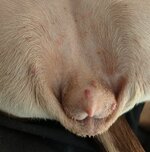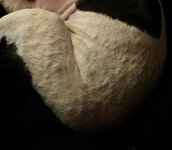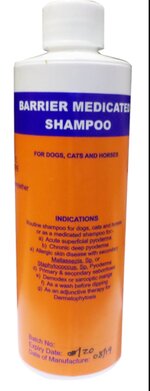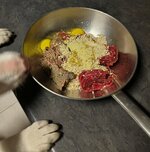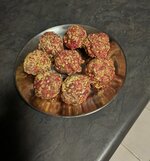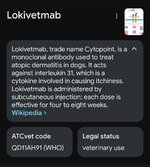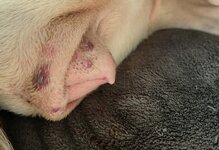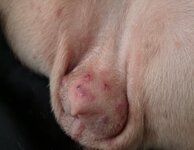You are most welcome, always happy to help!

Much appreciated.
I am not too familiar with Barrier medicated shampoo but if your vet has considered using it, I would follow their advice.
My vet is pretty useless, I've been prescribed two or three different shampoos and ointments before this.
Greek yoghurt is alright as a light supplement for daily use. Oral probiotics for dogs from Protexin is what I suggest.
Will add it to the list!
The dry flakes on her skin can be due to her sensitive skin or can also be related to Omega-3s deficiency. Again try her on marine oil supplements (Fish or Krill oil). Omega-3s are good for her skin, heart, brain and reproductive organs too
Noted! She gets a few sprats from time to time raw out the freezer. But I will try maybe adding some fish oil to her food directly.
For anti-histamines, try her with 2x cetirizine 10mg tablets first, if the hives still not resolved in 12 hours, try again another 2x 10mg tablets. Our 20kg GSD girl at home sometimes gets allergy flare-ups and a 2x 10mg dose is enough to help her.
Awesome, thank you.
So I need:
-Cetirizine (Zyrtec) 10mg x2 tablets for the hives as they appear
-Fish Oil for Omega 3 added to food
-Protexin Oral Probiotic
-a Shampoo with Chlorhexidine
-Coconut oil applied topically
Will get to it.
Currently she gets two meals a day.
Breakfast she gets 800g of cooked food that I prepare. I cook it. Once a week. It ends up being about 8kg and lasts about a week. The ingredients vary and the meat varies between beef, venison, wild pig, zebra, fish, chicken etc. I buy from a local business that gets directly from Hunters and process it themselves. Breakfast includes:
-Brown rice 1 cup
+-2/3kg of the assorted meats listed above
+-500g organ mince
-Chicken necks & livers
-5 eggs
-Sweet Potato x2
-Gemsquash x1
-Green Beans x one handful
-Butternut x1
-Broccoli & Cauliflower
-Carrots x2/3
-five tablespoons olive oil
-she gets a teaspoon of "arthro-focus" joint supplement with breakfast.
I slow cook for a few hours and then let cool and refrigerate. She loves it and haven't noticed any patterns between the food and bumps.
Her 2nd meal is a sort of Satin ball I make. She gets one a day around lunchtime and I make 7 or 8 at a time, roll them up and refrigerate. They're the size of a tennis ball roundabouts. Includes:
-2 eggs
-1/2 cup rolled oats
-1/2 total cereal
-3tbsp olive oil
-1kg beef mince
-2tspn Gelatin
Not sure if there's anything in there that could cause issues? Thanks!!
